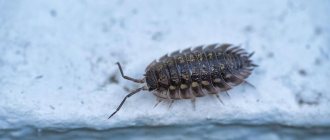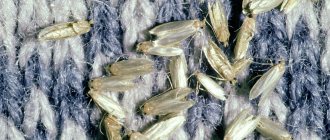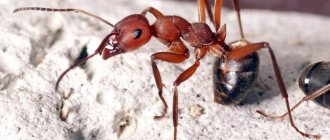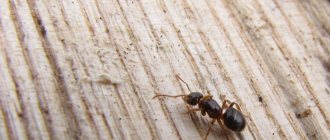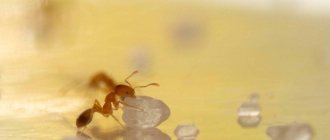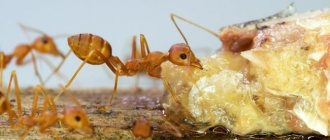Ants come to the site seriously and for a long time, build an anthill on it and form a colony with a queen at the head. The trouble is that this large family turns out to be extremely gluttonous and generally causes nothing but inconvenience.
The fight against ants in a summer cottage often takes place with varying degrees of success and does not always end in the final victory of a person. In addition, many feel sorry for the little inhabitants of the site, since since childhood they have been considered “orderlies of the forest and surrounding areas.” However, the dacha is usually ruled by garden ants, which at the same time breed aphids - the most dangerous and hardy pest. So is it necessary to get rid of ants in the country?
Forest ants are beneficial and rarely settle in gardens
Fighting ants on the site - pros and cons
Recently, the fight against ants in the countryside has become a full-scale war. You can find a huge amount of pesticides from manufacturers and garden stores that are destructive to all living things, including ants. It is believed that these insects bring invaluable benefits.
| Why are ants useful in the country? |
|
Garden ants feed on greenery and actively attract aphids to the site
However, there are still more opponents of ant families on the site, because all their advantages are offset by the indirect and direct harm that these insects cause.
| What damage do ants cause to |
|
In addition, brown , turf , red-cheeked and common garden ants , and they feed on plants and are 100% pests. Thus, you still need to get rid of ants in your dacha, and we will tell you how to do this later.
Attracting Natural Enemies
To get rid of the unpleasant proximity to ants, you can add natural enemies to them. These include hedgehogs. These prickly creatures eat more than just apples and mushrooms. They are not averse to eating garden pests. Hedgehogs are omnivores and differ in the habits of predators. If you come across an anthill on the way, this creature will most likely destroy it and eat some of the inhabitants.
Settling several hedgehogs in a cultivated area will allow insects to quickly survive. Frogs are also not averse to eating ants. Their diet mainly consists of flies and mosquitoes. But for variety, they also eat ants. Garden pests will not like such a neighborhood. Moles, some breeds of birds, and lizards feed on ants.
How to choose an ant repellent
The vast majority of ant preparations contain two substances: diazinon and chlorpyrifos.
Diazinon literally “hits the heart” of insects. It blocks the production of an enzyme responsible for the functioning of the nervous system of ants. They begin to have convulsions, leading to paralysis and death. In addition, it is actively absorbed by the root system of plants and protects them from pests for 2-3 weeks.
Chlorpyrifos enters the body of insects through the respiratory system and paralyzes the nervous system. The chemical is retained in the soil for 110-120 days, and it remains effective against pests for about 1-2 months.
Below we provide a brief table of the main drugs used to kill garden ants.
| Name | Active substance | Release form | Hazard Class | Consumption rate | Time to achieve effect |
| Absolute | Chlorpyrifos | Gel, plastic containers | Class IV (low-hazard drugs) | 125 ml per 30 sq.m or 2-3 containers per 10 sq.m | 10-14 days |
| Anti-ant | Borax | Powder in blisters and bags | IV | 1 container per 1-2 sq.m. | 5-6 days |
| Bros | Chlorpyrifos | Powder | IV | 10 g per 1 sq.m. | 1 day |
| Great warrior | Diazinon, chlorpyrifos | Gel | IV | 30 mg per 1 sq.m – drops onto pieces of cardboard and place next to the anthill | 1-1.5 days |
| Grom-2 | Diazinon | Granules | Class III (moderately hazardous to humans and animals) | 1-3 g per anthill | 2-4 days |
| Delicia | Chlorpyrifos | Powder | IV | 10 g per 1 sq.m. | 10-14 days |
| Medvetox | Diazinon | Granules | III class | 20 g per 10 sq.m. | 3-5 days |
| Ant-eater | Diazinon | Emulsion concentrate | III class | 1 ml/10 l of water per 5 sq.m. | 1-2 days |
| Ant | Diazinon | Granules | III class | 20 g per 10 sq.m. | 3-5 days |
| Muratox | Diazinon | Emulsion concentrate | III class | 1 ml/10 l of water per 5 sq.m. | 3 days |
| Muratsid | Diazinon | Water emulsion | III class | 1 ml/10 l of water per 5 sq.m. | 1 day |
When treating an area against ants, it is better to use eye and respiratory protection.
Ant
The main active ingredient of this insecticide is diazinon. The drug acts as a food bait (it looks like granules). The pellets are eaten by ants, and then the process of paralysis begins. Some of the pesticides remain on the parasites' paws, so when they get into the nest, other relatives are also infected. As a result of the Ant's action, the complete destruction of the population is possible.
How to remove ants from a site
If you are not a supporter of chemical means of fighting ants, you can try other, more humane methods that allow you to drive ants out of the area without destroying their strong “family”. In particular, try the following methods:
- ants react acutely to various odors. Therefore, you can regularly place the following aromatic carriers around their shelter (though you yourself must be tolerant of them): anise leaves , smoked herring heads , sawdust mixed with grated garlic . Or simply pour kerosene over (but under no circumstances set it on fire!);
- If you have wormwood and parsley , you should not be afraid of ants, because they also prefer to avoid these plants. garlic among strawberry plantings ;
- you can also use vegetable oil , tobacco ash , crushed tomato and parsley , turpentine and charcoal ;
- ants avoid trees whose base is treated with hemp oil ;
- The hunting belt protects not only from various caterpillars and small insects, but also from ants. An improved barrier is a strip of foil with foam rubber placed under it ;
- Ants are poor swimmers, so trees can be protected by building clay ditches filled with water . The width and depth of the ditches may not exceed 3-5 cm, but in this case the ants will not be able to climb the tree;
- bricks , pieces of iron or stones near the nest passages and water them with an infusion of manure or any herbs (except those that repel ants). After 2-4 days, pick up these objects and pour boiling water over , simultaneously pouring hot water into the passages;
- take some yeast (a handful should be no larger than a hazelnut) and pour it with a sweet mixture of sugar , water and honey to make a paste. Distribute the mixture into matchboxes and place them around the ant nests, covering them with something. After some time, the ants will begin to avoid these places.
Ants are afraid of water and cannot overcome even streams 2 cm wide
Malicious pests or valuable friends
The debate about ants has been going on for years. Some agronomists claim that insects are invaluable assistants to gardeners. Ardent opponents give many counterarguments. Therefore, chemists and biologists are tirelessly developing new ways to get rid of ants in the garden forever. A table that shows all the advantages and disadvantages of such a neighborhood will help you understand this issue.
Table - Positive and negative aspects of the appearance of garden ants
| Benefit | Harm |
| — Enrichment of the earth with potassium, phosphorus (these minerals serve as food for plants); - natural ventilation and moistening of the soil, due to which it becomes more fertile; — effective loosening of the soil; – destruction of eggs of spiders, caterpillars, flies, slugs | — Increased soil acidity, as a result of which many crops die; - spoilage of sweet berries, vegetables, fruits (ants, in search of food, nibble on all sugar-containing products); - inhibition of crop development, since colonies can be established in berry fields or bushes; - death of flowers (especially roses and peonies, which have sweet nectar); — death of trees (ants crawl under the bark and can turn a young tree into dust in a year or two); - rapid spread of aphids, as ants destroy all insects that covet their delicacy; - transfer of weed seeds throughout the garden |
As can be seen from the table, the harm is much more noticeable. Therefore, if you notice an anthill in your garden or vegetable garden, you need to start fighting the uninvited guests.
How to deal with ants in the garden
Ants are most annoying while they are in the garden. If you want to know how to kill ants, use a few proven methods:
- to scare away ants, place a rag soaked in kerosene . calendula next to currant and gooseberry plantations - it attracts ladybugs, which actively eat aphids;
- tie the tree trunk with cotton wool or wool soaked in a carbolic solution . Also create a palm-wide soot and linseed oil
- Attach bottles of sugar water and lubricate their necks with syrup or anise oil ;
- if the ants have settled at the roots of the tree, use ordinary or bleach . Sprinkle quicklime on the ant heaps and pour water over them. A 20% solution of carbolic acid will also put insects to flight;
- Indirect attacks on ants should be done when fighting aphids. of the branches into a bowl of soap-salt or soap-ash solution and rinse there. Such a “shower” corrodes the skin of the aphid and it becomes unviable.
To prevent ants from running through trees, use hunting belts soaked in kerosene
Description of the insect
Ants are insects belonging to the family Formicidae. They can be found almost all over the world, some are protected, for example, the meadow ant (Formica pratensis) is listed in the Red Book, found in forests, and is a beneficial insect. Other species can cause real damage to our gardens. The following species are found in the immediate environment of humans:
- black garden ant (Lasius niger);
- yellow earthen (garden) (Lasius flavus);
- turf (Tetramorium caespitum);
- red or red myrmica (Myrmica rubra).
How to get rid of ants in the garden
Various methods are also used to protect garden crops from ants, and the most effective of them look like this:
- sprinkle the anthill with salt , and also scatter it along the “paths” and places of greatest concentration of insects. Add a few elderberry and wild mint to make life miserable for ants;
- add 400 g of laundry soap and 2 tbsp carbolic acid , as well as 10 tbsp. kerosene _ Thoroughly dissolve the soap and mix the composition. Water the anthill, tunnels, and also the bases of the trees along which they crawl with the resulting mixture. After 2-3 such treatments, the ants will prefer to move to another place;
- mix dried and crushed oregano with sulfur in a 1:2 ratio, dig up the ground in the place where the ants settled and fill in the prepared mixture. stove soot near the ant colony ;
- if the ants have just begun to form a colony, they can be caught with a simple bait - to do this, soak a sponge in a sugar solution and when the ants run onto it, immediately dip it in boiling water . Do this several times until the insect population is minimal;
- One of the relatively “humane” methods is the forced eviction of ants . At dusk, when all the insects have returned “home,” take a shovel and dig out the entire anthill in two or three times. Quickly transfer it, along with its inhabitants, into a bucket and take it outside the site, preferably into the forest. Pour boiling water over the hole;
- Traditionally, in open areas, ants are repelled by the smell of garlic cloves , tomato tops or parsley leaves , ground cinnamon and other pungent aromas.
The easiest way to lure ants is in fragrant and sweet traps.
What plants do garden ants not like?
This is probably the simplest and most ingenuous way to forget about ants: plant plants whose smell they cannot stand:
- Parsley;
- Tomatoes;
- Mustard;
- Mint;
- Onion;
- Marigold;
- Garlic;
- Carnation.
Some plants can be grown for harvest, and at the same time make an excellent ant repeller. Others - we grow them as garden decorations
Ants in the country - how to get rid of them in the house
Sometimes ants move into the house and begin to destroy food supplies in the home. To combat them, you can use the following methods:
- place baits consisting of 50 ml of water , 5-6 g of borax (tetraboric acid salt) and 50 g of sugar ;
- Those with a sweet tooth love jam – especially raspberry, cherry and strawberry. Add 20 g of fresh yeast and 5 g of boric acid to 500 g of jam . The ants will happily pounce on the delicacy, but it will most likely be their last - most of the individuals will die within 2 days;
- Since chemicals cannot be used in the apartment, you need to use products that are safe for humans, but unpleasant for insects. For example, such as sunflower oil , elderberry , tomatoes , wild mint , cloves , wormwood and garlic ;
- take a piece of old yellowed lard (100-200 g) and fry it on all sides. Leave the lard on a plate near the ant passages. Believe me, rarely is any product capable of repelling small pests so strongly;
- Boric acid against ants has been proving its effectiveness for several years now. It paralyzes the nervous system of insects and they soon die. of sugar in boric acid and leave them in this form in an open place. Or you can use 2-3 tsp. dry minced meat and soak them with 1 tsp. boric acid.
Sugar soaked in boric acid is the best remedy for ants
Safety precautions
When using all types of drugs or folk remedies, be sure to remember the safety rules:
- When carrying out processing, it is necessary to use protective gloves and, if necessary, a respirator.
- During work, you must not consume food or drinks.
- Baits should be placed in places protected from children and pets.
- When preparing solutions, do not use containers used for food purposes.
- All spraying and treatments are carried out only in dry, calm weather.
- Upon completion of work, hands must be thoroughly washed, clothes and shoes washed.
- You should always carefully read the labels and manufacturer's recommendations, observe the specified waiting period, during which you should refrain from contact with the treated surface. After using insecticides, it is necessary to strictly observe the deadlines for manual work.
Compliance with the rules listed above will avoid poisoning and other unwanted side effects.
Attention! Any chemicals used in the garden can affect our immediate environment. Their use must be taken into account, especially when children and animals (dogs, cats) live in the house. Chemicals also affect crops (vegetables, fruits) and other insects (for example, beneficial pollinators - bees).
Ants are one of the most common garden pests. Without timely treatment, their colonies quickly spread throughout the area, causing serious damage to various crops.

